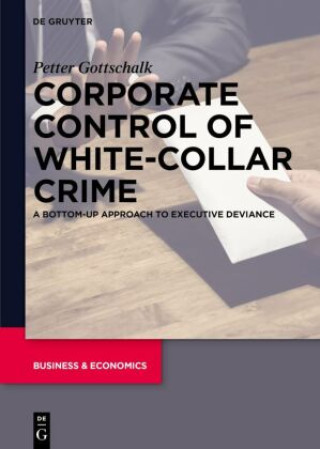
Kód: 45723989
Corporate Control of White-Collar Crime
Autor Petter Gottschalk
Traditionally, corporate control is all about top-down approaches to management of employees. Executives attempt to influence employees toward achieving business goals, and they attempt to prevent and detect wrongdoing, misconduct ... celý popis
- Jazyk:
 Angličtina
Angličtina - Väzba: Brožovaná
- Počet strán: 225
Nakladateľ: De Gruyter, 2024
- Viac informácií o knihe

22.28 €
Bežne: 23.23 €
Ušetríte 0.95 €
Dostupnosť:
50 % šanca Máme informáciu, že by titul mohol byť dostupný. Na základe vašej objednávky sa ho pokúsime do 6 týždňov zabezpečiť.
Máme informáciu, že by titul mohol byť dostupný. Na základe vašej objednávky sa ho pokúsime do 6 týždňov zabezpečiť.Prehľadáme celý svet
Mohlo by sa vám tiež páčiť
-

Dune
10.52 € -14 % -

Haunting Adeline
30.76 € -

Berserk Deluxe Volume 2
52.64 € -

White Nights
3.57 € -24 % -

Powerless
11.95 € -8 % -

Atomic Habits
15.94 € -15 % -

Dune Messiah
8.99 € -20 % -

Berserk Deluxe Volume 3
52.85 € -

One Day
12.57 € -13 % -

Berserk Deluxe Volume 1
51.01 € -

Iron Flame
16.25 € -19 % -

Surrounded by Idiots
11.75 € -21 % -

Harry Potter and the Prisoner of Azkaban (Minalima Edition)
27.19 € -33 % -

Gravity Falls Journal 3
22.07 € -

Heaven Official's Blessing: Tian Guan Ci Fu (Novel) Vol. 1
21.46 € -

The Creative Act
24.02 € -13 % -

Dune
9.70 € -19 % -

Hunting Adeline
31.79 € -

A Little Life
17.47 € -

Children of Dune
8.78 € -22 % -

Heaven Official's Blessing: Tian Guan Ci Fu (Novel) Vol. 2
22.07 €
Darujte túto knihu ešte dnes
- Objednajte knihu a vyberte Zaslať ako darček.
- Obratom obdržíte darovací poukaz na knihu, ktorý môžete ihneď odovzdať obdarovanému.
- Knihu zašleme na adresu obdarovaného, o nič sa nestaráte.
Informovať o naskladnení knihy
Zadajte do formulára e-mailovú adresu a akonáhle knihu naskladníme, zašleme vám o tom správu. Postrážime všetko za vás.
Viac informácií o knihe Corporate Control of White-Collar Crime
Nákupom získate 55 bodov
 Anotácia knihy
Anotácia knihy
Traditionally, corporate control is all about top-down approaches to management of employees. Executives attempt to influence employees toward achieving business goals, and they attempt to prevent and detect wrongdoing, misconduct, and crime among employees. However, top-down approaches to corporate control do not work when executives and other privileged individuals in the business themselves commit and conceal their wrongdoing, misconduct, and crime in organizational settings. Then there is a need for a bottom-up approach in corporate control as outlined in this book. Bottom-up control refers to the manner in which organizational members can use different types of control mechanisms - such as whistleblowing, transparency, resource access, or culture - to monitor, measure, and evaluate executives' avoidance of deviant behaviors and influence them toward achieving the organization's goals in efficient and effective ways. The newly emerging perspective of a social license to operate forms part of the bottom-up strategy where criminalization becomes social property independent of the criminal justice system. The social license is predominantly centered on social permission for business activity where the media, social movements, and citizen watchdogs exert pressure, demand change, and bring top management to account. This book presents a novel approach to corporate control of white-collar crime based on the theory of convenience. White-collar crime is financial crime committed by privileged individuals who have legitimate access to resources based on the power and trust inherent through their professional positions. Convenience theory proposes that motive, opportunity, and willingness are the three dimensions that underlie white-collar crime in an organizational context. This book contributes to the study of white-collar criminality through a blend of theoretical discussions and practical materials that illuminate and support the use of convenience theory. The book discusses how bottom-up approaches can overcome the difficulty of detecting white-collar crime and overcome the barriers of preventing executive deviance.
 Parametre knihy
Parametre knihy
Zaradenie knihy Knihy po anglicky Society & social sciences Social services & welfare, criminology Crime & criminology
22.28 €
- Celý názov: Corporate Control of White-Collar Crime
- Podnázov: A Bottom-Up Approach to Executive Deviance
- Autor: Petter Gottschalk
- Jazyk:
 Angličtina
Angličtina - Väzba: Brožovaná
- Počet strán: 225
- EAN: 9783111536781
- ID: 45723989
- Nakladateľ: De Gruyter
- Rozmery: 240 × 170 mm
- Dátum vydania: 21. August 2024
Osobný odber Bratislava a 2642 dalších
Copyright ©2008-24 najlacnejsie-knihy.sk Všetky práva vyhradenéSúkromieCookies


 21 miliónov titulov
21 miliónov titulov Vrátenie do mesiaca
Vrátenie do mesiaca 02/210 210 99 (8-15.30h)
02/210 210 99 (8-15.30h)